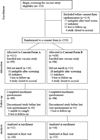Randomization to standard and concise informed consent forms: development of evidence-based consent practices
- PMID: 22542645
- PMCID: PMC3408575
- DOI: 10.1016/j.cct.2012.04.005
Randomization to standard and concise informed consent forms: development of evidence-based consent practices
Abstract
Background: Consent to participate in research is an important component of the conduct of ethical clinical trials. Current consent practices are largely policy-driven. This study was conducted to assess comprehension of study information and satisfaction with the consent form between subjects randomized to concise or to standard informed consent forms as one approach to developing evidence-based consent practices.
Methods: Participants (N=111) who enrolled into two Phase I investigational influenza vaccine protocols (VRC 306 and VRC 307) at the NIH Clinical Center were randomized to one of two IRB-approved consents; either a standard or concise form. Concise consents had an average of 63% fewer words. All other aspects of the consent process were the same. Questionnaires about the study and the consent process were completed at enrollment and at the last visit in both studies.
Results: Subjects using concise consent forms scored as well as those using standard length consents in measures of comprehension (7 versus 7, p=0.79 and 20 versus 21, p=0.13), however, the trend was for the concise consent group to report feeling better informed. Both groups thought the length and detail of the consent form were appropriate.
Conclusions: Randomization of study subjects to different length IRB-approved consent forms as one method for developing evidence-based consent practices, resulted in no differences in study comprehension or satisfaction with the consent form. A concise consent form may be used ethically in the context of a consent process conducted by well-trained staff with opportunities for discussion and education throughout the study.
Trial registration: ClinicalTrials.gov NCT00776711 NCT00858611.
Published by Elsevier Inc.
Figures
References
-
- Sloan J, Resnick GD. The consent form revisited. Arch Intern Med. 1993;153:1170–1173. - PubMed
-
- Beardsley E, Jefford M, Mileshkin L. Longer consent forms for clinical trials compromise patient understanding: so why are they lengthening? J Clin Oncol. 2007;25:e13–e14. - PubMed
-
- Albala I, Doyle M, Appelbaum PS. The evolution of consent forms for research: a quarter century of changes. IRB. 2010;32:7–11. - PubMed
-
- Wendler D, Grady C. What should research participants understand to understand they are participants in research? Bioethics. 2008;22:203–208. - PubMed
-
- Emanuel E, Grady C, Menikoff J. Is longer always better? Hastings Center Report. 2008;38:10–12. - PubMed
Publication types
MeSH terms
Associated data
Grants and funding
LinkOut - more resources
Full Text Sources
Medical


